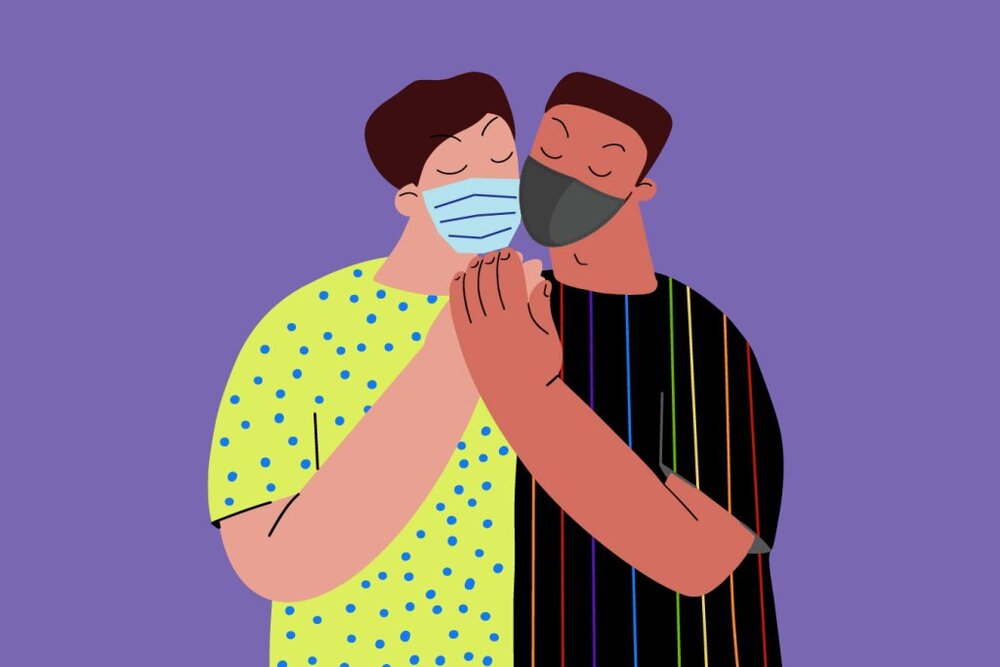
April 25, 2021
Dr. Jeffrey Klausner, a primary care physician in Los Angeles, has treated gay men for decades. Since the start of the coronavirus pandemic, he said, many patients have so dramatically changed their sexual behavior that they shrug off the need for routine screenings for sexually transmitted diseases.
“They say, ‘I haven’t had any contact since I saw you last, so there’s no need to do any STD tests,’” said Klausner, an adjunct professor of epidemiology and infectious diseases at UCLA.
But attitudes among these patients are shifting, Klausner has noticed, now that California and other states are loosening policies on social distancing. “People are starting to think about a return to engaging [in sex],” he said, “and are asking me, are there ways they can remain safe” from COVID-19?
Concerns about sexual intimacy during an epidemic are universal and not limited to gay men, of course. Public health experts, including those long involved in HIV prevention, recognize that a proportion of all people are likely to ignore or reject categorical mandates about sexual behavior — whether they involve using condoms or limiting contact because of social distancing norms.
“It didn’t work when we had to deal with HIV, and it won’t work in dealing with COVID,” said Pierre-Cédric Crouch, a clinical nurse researcher at the University of California-San Francisco, and an expert in HIV prevention.
The coronavirus is known to spread through oral and nasal secretions but not specifically through sexual intercourse. In New York City, the health department issued sex and coronavirus guidelines that counsel against sex with those outside your household but advise those who choose otherwise to “have as few partners as possible.”
The guidelines, which note that “kissing can easily pass the virus,” suggest that people “make it [sex] a little kinky” by being “creative with sexual positions and physical barriers, like walls, that allow sexual contact while preventing close face to face contact.” In the Netherlands, the government has advised single people considering sex to find a symptom-free sexual partner.
For many gay men, especially in urban areas, sexual exploration with multiple partners is a way of life, whether single or not. Many committed male couples maintain open relationships.
Research supports the notion that gay men tend to have more sexual partners than do heterosexuals. A 2012 review of surveys among adults ages 18 to 39 noted that men who have sex with men (a phrase often used in scientific studies that focus on sexual behavior rather than sexual identity) “reported significantly more lifetime partners than heterosexual men and women at all ages.” In the 35-39 age group, the median lifetime number of sexual partners reported by men who have sex with men was 67, compared with 10 for heterosexuals, according to the study.
Damon Jacobs, a therapist with many gay clients, lives alone in Brooklyn and remained celibate for the first month of the lockdown. At that point, he said, he reached out to a regular and trusted sexual partner.
Recent News

How is HIV Transmitted?
February 18, 2026

How TelePrEP Makes HIV Prevention More Accessible
January 15, 2026

Understanding HIV vs. AIDS
December 11, 2025

Understanding Vivitrol: How It Supports Recovery from Opioid and Alcohol Dependence
November 13, 2025

How to Talk to Your Partner About STD Testing
October 27, 2025

Why Sexual Health Awareness Month Matters: Breaking Stigma & Promoting Care
September 18, 2025

How Often Should You Get Tested for STDs?
August 15, 2025